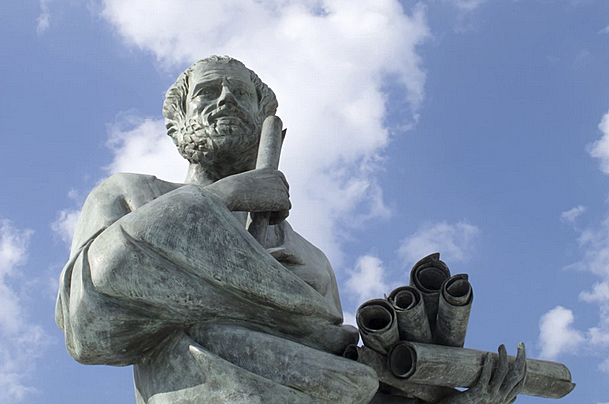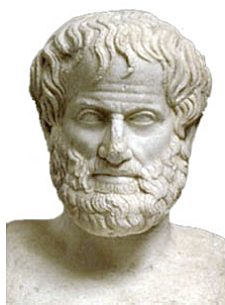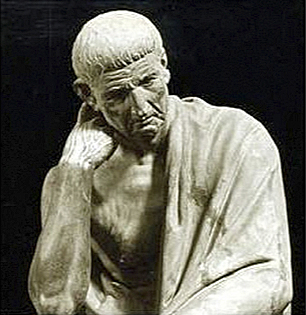
- Articles
Aristotle, polymath and philosopher for all seasons by Miguel A. Faria, MD
This is a review of the book Aristotle by John Herman Randall, Jr., Easton Press leather bound edition (1990).
The author John Herman Randall (1899-1980) was an educator, Professor of Philosophy at Columbia University, and a humanist, signer of the Humanist Manifesto (1933). A favorable Foreword for the book was written by the Reverend Joseph Owens, C. Ss. R. (1908-2005), a Canadian Roman Catholic priest and philosopher, a Christian scholar of St. Thomas Aquinas, Aristotle, metaphysics, and medieval philosophy. This Foreword adds to the value of this tome.
However, the Foreword is somewhat misleading, as the good priest set out apparently to find what was good in the work, and he found enough of it to be able to write a praiseworthy introduction. True, as intimated by Father Owens, the author Randall admires and places Aristotle on the intellectual pedestal “The Philosopher” deserves. Father Owens points out and praises Randall and “his penetrating insight to insist that Aristotelianism ‘can be applied to any social and cultural materials…to Soviet Russia, to medieval Christendom, to India, to New York City.’ ” This was apparently the type of statement Father Owens was looking for. But the good priest failed to see that the author also insisted repeatedly that any connection between Aristotelianism and medieval Christianity is a false connection, and emphasized over and over that when the thought of The Philosopher is reconciled to Christian thinking, the reconciliation is deliberate falsification by early Jewish, Islamic, and particularly Christian scholars.
Quoting again from page 248 in the text, Father Owens is more discerning when he writes, “Randall goes on to conclude that if Aristotle were writing today for contemporary Americans, he would not elevate knowing above practical action.” But here Father Owens disagrees, “Aristotle’s own teaching, on the contrary, is unshakable firm in the opposite stand. For him, the whole purpose of practical and productive activity is to bring about the conditions in which intellectual life can take place.” I agree with Father Owens.
Aristotle is reportedly Randall’s most influential book, which should not be surprising as Randall, immersed in the milieu of modern liberalism of academia, interprets Aristotle, the Greek polymath of antiquity, in the most “progressive” light possible. This book is not a biography but a study and interpretation of the writings of Aristotle, writings interpreted by and viewed through the secular humanist prism of the author. Additionally Randall turns out to be a follower of the “New Thought” movement, formed in the19th century and very much active in the 20th century. The movement fuels Randall’s humanistic and secularist tendencies exerting an inordinate influence in his interpretation of the various aspects of Aristotle’s books, particularly Metaphysics, Ethics, Physics, and to a lesser degree Politics — books that have exerted, despite Randall’s objections, considerable influence in Judeo-Christian philosophy and Western religious morality. Nevertheless, the author repeatedly argues that Aristotle is deliberately misunderstood by Christian theologians, engaging in “double talk” [p. 136], and that any connection between Aristotelianism and Christian philosophy, including the scholasticism of St. Thomas Aquinas, the teleological argument, and the concept of intelligence design, should be severed.

For Randall, Aristotle is a gifted and conscientious polymath who has written in all branches of knowledge and continues to exert influence in contemporary society. No one can disagree with that general view. The problem seems to be that Randall returns, again and again, insisting that Aristotle, the man St. Thomas Aquinas called “The Philosopher,” has been misrepresented deliberately by theological scholars since the Middle Ages. Convinced of his own infallibility, one of Randall’s main objectives is to sever Aristotle completely from any legitimate ties with Judeo-Christian philosophy, ethics, or religious morality. According to Randall, the alleged reconciliation of parts of the Abrahamic religions, as forged by St.Thomas Aquinas, Dante Alighieri, Avicenna, Averroës, Maimonides, etc., with Aristotelianism, particularly the Christian religion, is a deliberate fabrication by the religious authorities. The teleological argument is a bogus argument, particularly in its association to Aristotelian thought and logic. And when Aristotle himself talks of God, the Prime Mover, the heavens, and the divine, etc., he is engaging in the transcendental but “mythic theology” of Plato as encapsulated in his Timaeus Dialogue.
Aristotle’s primacy of Final Cause does not support the teleological argument or evidence of purpose, and it provides no basis for the philosophic theory of intelligent design with God as the Prime Mover because, writes Randall, for Aristotle, “God has no purpose, only man” [p. 124-125], and insists that Aristotle’s “Unmoved Mover” has nothing to do with a Creator, God, or First Cause [p. 134-136].
Aristotle must be thoroughly secularized for proper understanding, according to Randall, and brought into the humanistic and secular folds of positivist thinkers. He must be extricated from any Abrahamic religious connection. To be understood in this context, the mature Aristotle must be interpreted, at most, in the light of the 17th century pantheism of Spinoza, or through the mathematical analysis of such progressive philosophers of the 20th century as John Dewey, Bertrand Russell and Alfred North Whitehead, or critics of traditional morality, such as Friedrich Nietzsche.
When “The Philosopher” talks about the good, divine and eternal, he is merely indulging himself in his early writings of the Platonic myths, as when Aristotle discusses God, as the “Unmoved Mover,” in book Lambda of Metaphysics, written when Randall supposes Aristotle was still an inexperienced youth and still an adherent of Plato and the Academy. For Randall, apparently, the central divinity of Plato in “The Idea of the Good” is not enough to satisfy the tenets of his own “New Thought” philosophy, which, in fact, in its first tenet smacks of Platonism. The New Thought movement, developed in the 19th century, held: (1) “God was Infinite Intelligence, supreme, universal, and everlasting”; (2) “divinity dwells within each person, all people being spiritual beings”; (3) “the highest spiritual principle is to love one another…” It may be that Randall’s own philosophy, emphasizing the second and third tenets, approaches more the skepticism of the 5th century B.C. sophist Protagoras, with his central dictum that “man is the measure of all things,” than to Aristotle’s teaching of man as a rational animal but driven by passions and desires, a creature that can sometimes be driven to commit irrational and brutal acts by the lack of the moral and intellectual virtues, such as lacking prudence (phronesis) and self-control, and acting instead incited by evil vices or brutishness.
Instead of injecting Judeo-Christian religion into Aristotle, Randall attempts to elevate Aristotle to the position of father of the modern “welfare state,” pointing out Aristotle’s declaration in his book Politics that “man is a political and social animal.” Randall posits, from Aristotle’s concept of the Good Life and Acting Well, that the ends of ethics and politics is human welfare. But then he takes a quantum leap, asserting that Aristotle refers to more than the individual well-being in relation to the polis and society, Randall also insists that Aristotle meant that the government should have the power to do whatever is necessary to promote the “welfare state,” which we may take to assume to include wealth redistribution, the use of social and economic engineering, as necessary powers to comply with such a mandate. Randall is aware that his interpretation of Aristotle in this area may have totalitarian implications [p. 250-253].
Randall contradicts himself, opining in an unguarded moment, that for Aristotle virtues and ethics, “there seem to be little place in our socialized world” [p. 250]. But unlike Plato’s Republic, one only needs to read Aristotle’s relevant books, Nicomachean Ethics and Politics to understand that Aristotle did not contemplate any socialistic or totalitarian dreams. The Good Life for Aristotle was the cultivation of the moral and intellectual virtues while exercising the duties of citizenship for the well-being of his city-state, the polis.

Regarding profits and justice, Aristotle in Nicomachean Ethics (Book V) wrote: “Injustice in the sense of distributive justice is a violation of proportions. Distribution should be made in accordance with merit or with the ratio of the contributions which have been made to the fund. And regarding the welfare state, Aristotle wrote in Politics (Book VI): “The Demagogue can not be allowed to distribute the surplus even in a just and fair society, the poor receive more and more help but such help is like water poured into a leaky casket.” And just for the record, in praise of private property, Aristotle wrote in Politics (Book II, chapter 5): “How immeasurably greater is the pleasure, when a man feels a thing to be his own; for surely the love of self is a feeling implanted by nature and not given in vain, although selfishness is rightly censured… No one, when men have all things in common, will any longer set an example of liberality or do any liberal action; for liberality consists in imparting to others what is our own.” Therefore, the destitute in society were to be treated with compassion by individual generosity (and the charity) of wealthy benefactors. Fostering in the polis a climate favorable for artisans to ply their trade, promoting commerce and the arts, advancing education and promoting a growing, healthy middle class were essential in a constitutional republic to maintain prosperity, peace and tranquility between the poor and the wealthy classes [Politics, Books II-IV]. Thus, the best polis is that which cultivates the moral virtues of its citizens so that individuals act with enlightened self-interest [Nicomachean Ethics, Book IX, chapter 8] and conduct business and trades honestly, intelligently, and prudently.
For Randall, Aristotle is also a proponent of situational ethics and moral relativism because The Philosopher supposedly has no fixed ethics and espouses no specific religious commandments. Man was to be his own judge in each situation. But this is erroneous: Aristotle had no illusions about man’s capacity to do evil acts and names three evil sins that a good man always must avoid: Vices, Incontinence, and Brutishness. Among the vices, Aristotle names cowardice, foolhardiness, bad temper, licentiousness, lack of self-control, etc. Those “brutish persons lacking self-control,” the intemperate and the wicked, posited Aristotle, must be made to behave properly and punished for their crimes by the force of law. Aristotle writes, “[The] legislators…punish and take vengeance on those who do wicked acts.” [Nicomachean Ethics Books I-III]
The fact is Aristotle is a man for all seasons, and his ethics are set in a rock solid foundation for moral conduct, absolute Moral virtues based on the means between extremes — namely virtues that are attained by habitually (hexeis) doing good and acting guided by reason. What are some of those absolute moral virtues by which man must act to be a good man? Justice, courage, good temper, good will, generosity, etc. As an example of means between extremes, Aristotle cites stinginess and ostentation; they are extreme behaviors in opposite directions. In between them, man should strive towards the middle and act instead with generosity. Besides the moral virtues, man also possess Intellectual virtues, which are absolute qualities of which excellent qualities man can never possess enough of: Good sense (intelligence), wisdom, and prudence. Obviously, then for Randall, Aristotle’s axiom that a good man in all occasions must avoid evil and vices, and that he should act virtuous, choosing ”the means between extremes,” is considered a relative proposition. I strongly disagree.
How can a philosopher not see Aristotle’s commandments — namely that a man must be good and virtuous, avoid sin and evil acts, such as killing or stealing, and always strive to act in good faith, bravely, justly, generously, benevolently — and be so blinded as to assert that Aristotle was a forerunner of the modern situational ethics and moral relativism? I believe that only a man blinded by his own preconceptions can make such implausible assertions. But the reader, after first reading the relevant works of Aristotle in his own words, should be able to draw his own conclusions. In fact, the best portions of Randall’s book are the final chapters on “Practical” and “Productive Sciences,” where Aristotle is quoted in large paragraphs, allowed to speak to the reader, and thus “interpreted” least by Randall. Such reading confirms what I came to believe as I read this tome, that Aristotle is best when read in his own words, which are usually clear and intelligible, sometimes reaching eloquence. Even with these criticisms, I believe that Randall, Owens, and this reviewer, can agree with Dante that “Aristotle is the teacher of those who know,” and that his work and his teachings live on, not only intrinsic to almost all branches of learning, but also as a major part of the foundation of Western civilization inextricably entwined with philosophy, ethics, and the Judeo-Christian heritage.
Note:
The reader is invited to read a related article on this subject: Faria MA. Religious morality (and secular humanism) in Western civilization as precursors to medical ethics: A historic perspective Surg Neurol Int 2015;6:105. Available online: https://haciendapublishing.com/religious-morality-and-secular-humanism-in-western-civilization-as-precursors-to-medical-ethics-a-historic-perspective/
Written by Dr. Miguel Faria
Miguel A. Faria, Jr., M.D. is Clinical Professor of Surgery (Neurosurgery, ret.) and Adjunct Professor of Medical History (ret.) Mercer University School of Medicine. He is an Associate Editor in Chief and a World Affairs Editor of Surgical Neurology International (SNI). He is the Author of Vandals at the Gates of Medicine (1995); Medical Warrior: Fighting Corporate Socialized Medicine (1997); and Cuba in Revolution: Escape From a Lost Paradise (2002)
This article may be cited as: Faria MA. Aristotle, polymath and philosopher for all seasons. HaciendaPublishing.com, January 11, 2017. Available from: https://haciendapublishing.com/aristotle-polymath-and-philosopher-for-all-seasons-by-miguel-a-faria-md/
Copyright ©2017 Miguel A. Faria, Jr., M.D.
2 thoughts on “Aristotle, polymath and philosopher for all seasons by Miguel A. Faria, MD”
Aristotle was very specific that the best government was what the Greeks called “democracy” with a large middle class governed by virtue, justice, and by the rule of law — in fact, he was describing a Republican form of government, as later described Cicero, the Stoics, and the Republican Romans. A democracy called turned into mobocracy led by a demagogue who called by the people with demagoguery and money taken from others in the community. So “democracy even then had pitfalls. What today is called democracy —where the mob is manipulated, elections and their indoctrination financed by elitist plutocrats like Soros, Gates, Bloomberg, and Co, and dependent on government (the Democrat Party) for handouts and propagandized by an elite establishment (the opinion cartel molders in the “liberal” media) —was unknown to Aristotle as such and, in fact, would have been decried by him as a corrupt form of government. In such a case a monarchy with a good king that worked for the common good would have been preferred, according to Aristotle (Politics).
Aristotle was very specific that the best government was what the Greeks called “democracy” with a large middle class governed by virtue, justice, and by the rule of law — in fact, he was describing a Republican form of government, as later described by Cicero, the Stoics, and the Republican Romans. A democracy turned into mobocracy when led by a demagogue who can seduce the people with demagoguery and money taken from others in the community. So “democracy” even then had pitfalls. What today is called democracy —where the mob is manipulated, and the elections and their indoctrination are financed by elitist plutocrats like Soros, Gates, Bloomberg, and Co, and the people are dependent on government (the Democrat Party) for handouts and propagandized by an elite establishment (the opinion cartel molders in the “liberal” media) —was unknown to Aristotle as such and, in fact, would have been decried by him as a corrupt form of government. In such a case a monarchy with a good king that worked for the common good would have been preferred to either a democracy or an oligarchy, according to Aristotle (Politics). Tyranny in any form was anathema to Aristotle, 🤔🧐😎